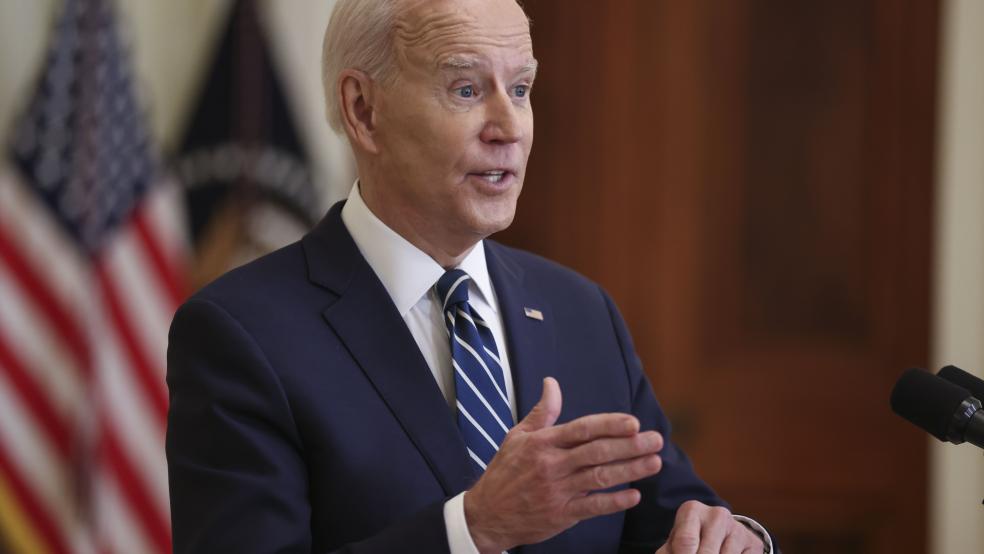President Joe Biden’s first news conference in office covered a range of topics, including the migrant surge at the southern U.S. border, GOP efforts to restrict voting rights, foreign relations with China and North Korea and the timetable for withdrawal of U.S. troops from Afghanistan.
But Biden also made clear that his next priority is the massive, two-part jobs and infrastructure bill that he said he will announce in more detail on Friday, and he made news on other fronts as well. Here are five key takeaways from Thursday’s turn in front of the news media:
A new goal for vaccinations: Biden opened his remarks by announcing a new target for Covid-19 vaccinations of 200 million shots administered in his first 100 days in office. The administration reached its previous goal of 100 million shots last week, and Biden said the new benchmark was “ambitious,” but given that the news conference came on Biden’s 65th day as president and that the country is now averaging about 2.5 million doses a day, the target should be reachable.
In what could be seen as a sign of how much progress has been made in the fight against Covid, Biden didn’t get asked one question about his pandemic response during the hour-long press conference. That could also be a sign of the news media’s Covid fatigue and limited attention span, given that new cases are still averaging nearly 60,000 a day and deaths are still averaging more than 1,000 a day, according to the Centers for Disease Control and Prevention, which warned this week that case rates are increasing slightly.
A focus on the infrastructure package: Biden said his “next major initiative” will be “to rebuild the infrastructure, both physical and technological infrastructure in this country so we can compete and create significant numbers of really good paying jobs.” He said he will announce more details Friday at an event in Pittsburgh.
That proposal reportedly will be broken into two parts, one centered on infrastructure and clean energy and the other focused on domestic priorities including education, paid leave and child care. The plan is expected to call for some $3 trillion in spending, paid for in part by tax increases on corporations and the wealthy. “I want to change the paradigm. We start to reward work, not just wealth,” Biden said Thursday.
Biden’s plan is sure to face sharp pushback from Republicans, who have already dismissed the idea of raising taxes.
Bracing for budget battles: Biden on Thursday derided the GOP’s fiscal approach. “When the federal budget is saving people’s lives, they don’t think it’s such a good idea,” he said, contrasting that to what he called GOP support for “feathering the nest of the wealthiest Americans.”
In answering a question on relations with Beijing, Biden also reiterated his call for government investment in science and research as a way to compete with China. “Back in the ‘60s we used to invest a little over 2% of our entire GDP in pure research and investment in science. Today it’s 0.7%. I’m going to change that.” Biden said the country must pursue investments in medical research on cancer, Alzheimer’s disease and diabetes in addition to research on artificial intelligence, quantum computing and biotechnology.
Support for filibuster reform: Biden, who served in the Senate for 36 years, said the filibuster is “being abused in a gigantic way” and that he “strongly supports” a return to a talking filibuster, which would require senators to stay on the floor to block legislation instead of just raising more painless procedural objections. He also indicated that he might support going further.
“We’re going to get a lot done, and if we have to, if there’s complete lockdown and chaos as a consequence of the filibuster, then we’ll have to go beyond what I’m talking about,” he said.
Biden also said he agreed that the filibuster is a “relic of the Jim Crow era,” but he didn’t specify what other changes he might support.
The future of the filibuster could be key to Biden’s hopes to advancing major elements of his agenda, and Biden likely doesn’t have the Democratic votes he would need to eliminate the filibuster completely, leaving him trying to pressure Republicans into backing an agenda that he emphasizes has wide public backing.
“Here’s the deal: I think my Republican colleagues are going to have to determine whether or not we want to work together or decide that the way in which they want to proceed is to just decide to divide the country, to continue the politics of division,” he said.
Biden expects to run for a second term: Biden is 78, the oldest president to take office, and there had been talk during the campaign that he might step aside after one term. He told reporters Thursday that he expects to run again in 2024, and that he expects Vice President Kamala Harris to again be on the ticket. Asked who he thinks he’ll be running against, Biden said he doesn’t think about it and has no idea: “I have no idea whether there will be a Republican Party. Do you?”





